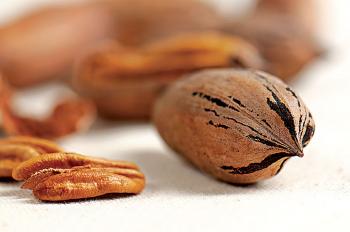
Small pecan crops expected in La., Miss., nationwide
NEW ORLEANS, La. (AP) — This year’s pecan crop in Louisiana is shaping up to be about one-third of last year’s. Nothing’s gone wrong; that’s just how pecans roll. Small crops follow big ones, and last year’s totaled 15 million pounds of nuts in the shell.
But the 5 million pounds likely to be harvested this year in Louisiana will include a higher percentage of big, top-quality nuts, said Randy Sanderlin, research coordinator at the LSU AgCenter’s Pecan Research Station in Shreveport.
“Pecans are a high-energy seed or nut — about 70 percent oil,” he said. “It takes a lot of oil to produce the nut and fill it out. When there’s a large crop on the tree it puts a large strain on the carbohydrate resources of the tree. They just can’t make as good a nut,” he said.
Nationwide, said Sanderlin, about 200 million pounds are expected. Last year’s crop totaled 302.8 million pounds, according to the U.S. Department of Agriculture.
Mississippi is also among the 14 pecan-producing states; its farmers harvested 3 million pounds in 2011 and 1.8 million last year, according to federal statistics. The statewide crop is expected to be 1.5 to 2 million pounds this year, said Max Draughn, whose Pecan Hill Farms in Raymond, Miss., includes about 300 acres of pecans.
“We had a late, cold spring, and we had a lot of rain this year,” he said. A rainy growing season means less sunshine and more disease pressure. “It means fewer nuts, smaller nuts,” he said.
When it’s time to harvest, machines shake the trees, then other machines blow the nuts between the rows for a third set of machines to harvest.
“When we shake the nuts off the tree we want to harvest them very quickly,” he said. “If they land on wet ground or get rained on, they lose quality very fast.”
Pecans are the only major tree nut native to the U.S., which produces about 80 percent of the world’s crop. The harvest season begins in the fall in Georgia and Florida and ends in February in New Mexico.
Georgia is usually the biggest pecan producer, followed by New Mexico, Texas, Arizona and Oklahoma. The top three states produced about 72 percent of last year’s U.S. crop. Most pecans bought in supermarkets are likely from those states, Draughn said.
All his pecans will be sold at three retail stores and over the Internet, he said.
At Bergeron Pecan Co. in New Roads, president Lester Bergeron said, “We’re covering our needs.” His company shells pecans bought from growers and from about 70 stations around the state, some of them grocery stores that buy pecans in the shell from individuals and farmers.
Draughn suggests that customers ask whether pecans are from this year’s crop and watch out for dark kernels or shells — an indication of older or improperly stored nuts. Kernels should be golden or light brown, he said.
According to the LSU AgCenter, the nuts can be stored for up to eight years at zero degrees Fahrenheit. That’s far colder than home freezers; at 32 degrees they’ll last an average of 18 months in the shell and a year if they’ve been shelled, according to a Pecan Research Station fact sheet. At refrigerator temperatures, count on six months for shelled pecans and nine months in the shell.
Want to grow your own? Winter’s planting time, but don’t try unless you have a big yard. The wood is brittle and the trees grow big. The AgCenter recommends planting pecans at least 20 feet — and preferably more — from houses or anything else that might suffer from a big branch landing on it.
And if you don’t live within a half-mile of other pecan trees, you need to plant two, making sure they’re different varieties.
“Pecans are cross-pollinated,” Sanderlin explained. “Each tree will produce both male and female flowers, but produce them at different times.”
The male “catkins” on some varieties release pollen before female flowers can be pollinated; other varieties release pollen after the female flowers are ready.
“If you had an acre of one kind, you’d wonder, ‘How come I’m not getting any nuts off these trees?” Sanderlin said.
- Log in to post comments
